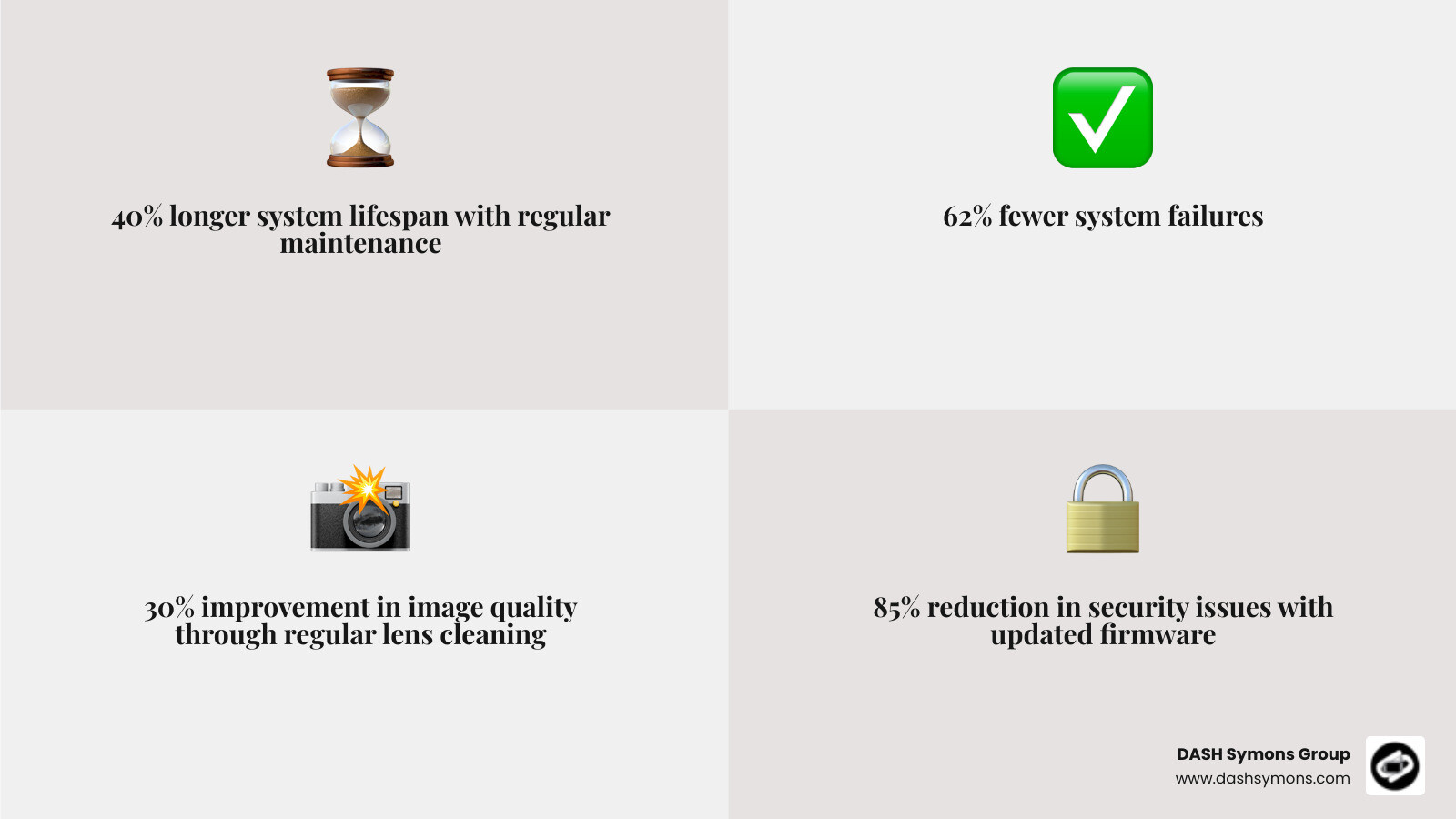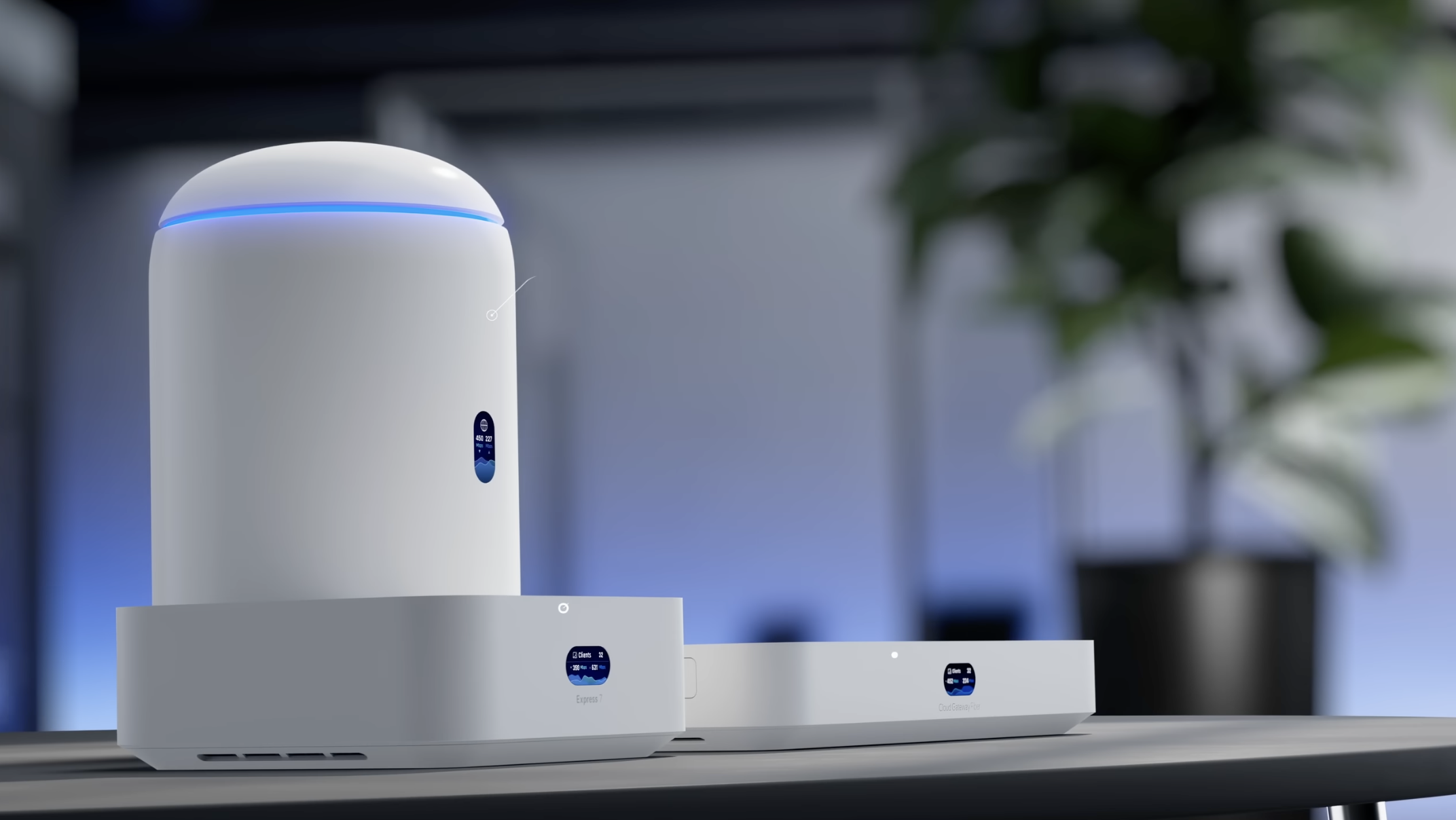Why Security Camera Maintenance is Critical for Your Business
Security camera maintenance is essential for ensuring your surveillance system works when you need it most. A system that fails to record during an incident is a common and preventable problem. Well-maintained systems last 40% longer and experience 62% fewer failures compared to neglected ones.
Quick maintenance checklist:
- Clean lenses every 3-6 months (monthly for outdoor cameras)
- Update firmware quarterly to prevent security vulnerabilities
- Check power connections monthly
- Inspect cables and mounts for damage
- Test recording and playback
- Clear obstructions like spider webs or vegetation
The cost of neglect is steep. About 80% of security system failures stem from a lack of maintenance, and 30% of security breaches occur because systems aren't properly maintained. Repair costs after a failure can be 200-300% higher than regular maintenance.
Simple, regular upkeep can prevent most issues. For example, regular lens cleaning alone can improve image quality by up to 30%. This guide will walk you through everything you need to keep your security cameras functioning at peak performance.

Why Regular Maintenance is a Smart Investment
Viewing security cameras as "set it and forget it" devices is a common mistake. Like any high-performance equipment, your security system needs regular care to perform optimally. Security camera maintenance is a strategic investment that delivers returns in system longevity, cost savings, and peace of mind.
Businesses are four times more likely than homes to be victims of property crime. With property crimes being a significant concern according to the FBI, functional cameras are essential for capturing clear, reliable footage. A well-maintained system reduces failures, protects your assets, and may even lower insurance costs.
Consistent security camera maintenance dramatically extends your equipment's lifespan. Well-maintained systems can operate for 7+ years, compared to just 2-3 years for neglected ones. This preventive care can prevent 80% of failures due to neglect and reduce total ownership costs by 30-40%. By keeping cameras in top shape, you ensure they capture clear footage for identification when it matters most. At DASH Symons Group, our professional solutions help maintain system reliability, protecting your investment for years.
Avoiding Costly Repairs and Security Breaches
A critical incident followed by a blank screen is the nightmare scenario of poor maintenance. Repair costs after system failures can be 200-300% higher than regular upkeep. A proactive approach reduces system failures by up to 70% compared to reactive strategies.
Furthermore, 30% of security breaches occur because systems are poorly maintained. Outdated firmware, dirty lenses, or faulty connections create vulnerabilities or render your system useless. A Programmed Maintenance plan can reduce system downtime by up to 75%, ensuring your cameras are always on guard.
The Hands-On Guide: Cleaning Cameras for Crystal-Clear Vision
Physical cleaning is the first line of defense against poor image quality. Dust, dirt, spiderwebs, and water spots can turn clear surveillance footage into a useless blur. Before you begin any cleaning, always power down the camera for safety.
Having the right tools for security camera maintenance makes all the difference. Gather these items before you start:
- Microfiber cloths: Use these soft, lint-free cloths to avoid scratching the lens.
- Canned compressed air: Blows away loose dust and debris without physical contact. Hold the can upright during use.
- Lens-specific cleaning solution: Regular glass cleaner will damage lens coatings. Use a solution made for optical equipment.
- Soft brush: A clean paintbrush or lens brush helps with stubborn dust.
- Stable ladder: Ensure your safety when accessing high-mounted cameras.
Step-by-Step Cleaning for Lenses and Housings
With the camera powered down, you can begin cleaning.
- Clear loose debris: Use compressed air to gently blow dust and webs off the camera body and lens area. A soft brush can help with stubborn webs.
- Clean the lens: Apply a few drops of lens-specific cleaning solution to a microfiber cloth—never spray directly on the lens. Wipe the lens with gentle, circular motions from the center outward.
- Clean the housing: Use a separate, slightly damp microfiber cloth to wipe down the camera body and housing to remove grime.
- Dry thoroughly: Use a fresh, dry microfiber cloth to dry all surfaces, preventing water spots.
Common Cleaning Mistakes to Avoid
Avoid these common mistakes to prevent accidentally damaging your equipment:
- Don't use paper towels or tissues: They are abrasive and will scratch the lens.
- Avoid household glass cleaners: The ammonia and other chemicals strip protective lens coatings.
- Never spray liquids directly onto the camera: Moisture can seep inside and cause short circuits.
- Don't use excessive pressure: A light touch is sufficient and prevents damage.
- Clean both sides of a dome cover: For dome cameras, remove the cover and clean the inside surface to eliminate hidden dust and condensation. Wear gloves to avoid fingerprints.
How Often Should You Clean?
Cleaning frequency depends on the camera's environment. Use these recommendations as a starting point, but clean your cameras any time you notice a decline in image quality.
| Camera Location | Environment | Recommended Cleaning Frequency |
|---|
| Indoor | Office/Home | Every 6 months |
| Indoor | Dusty/Industrial | Every 3 months |
| Outdoor | Sheltered | Every 3 months |
| Outdoor | Exposed/High-Pollen/Coastal | Every 1-2 months |
Cameras in environments with smoke or other airborne residues may require more frequent cleaning.
Beyond the Lens: A Full Security Camera Maintenance Checklist
Comprehensive security camera maintenance goes beyond cleaning lenses. It involves checking every component of your surveillance system—including cables, power supplies, recorders, and software—to ensure they work together flawlessly. This checklist covers the critical components that need regular attention.
Software and Firmware: The Digital Tune-Up
The biggest security threats to your cameras often come from outdated software. Firmware updates are your digital armor against cyber threats. Systems with the latest firmware are 85% less likely to experience security issues, as hackers actively scan for and exploit outdated software.
- Check for updates monthly: Manufacturers release patches that fix security holes, improve performance, and prevent crashes.
- Schedule automatic updates: If possible, enable automatic updates to ensure you're always protected.
- Verify settings post-update: Updates can sometimes reset configurations. A quick check ensures your system is still operating as intended.
Power and Connectivity Checks
Power issues account for nearly 60% of all CCTV problems, making these checks essential.
- Inspect cables: Look for fraying, wear, or pest damage, especially on outdoor installations.
- Ensure secure connections: Gently tug connections at the camera, power supply, and recorder. Loose connections cause about 70% of system failures.
- Test backup power: Regularly test your Uninterruptible Power Supply (UPS) to ensure it works during an outage. A UPS with Automatic Voltage Regulation can make your system 50% more reliable.
- Verify Wi-Fi signal: For wireless cameras, check the signal strength in your camera's app to prevent dropped frames and disconnections.
Physical Inspection and Environmental Awareness
Your cameras are constantly exposed to the environment. Regular physical checks can prevent small issues from becoming major problems.
- Check camera mounts: Ensure mounts are stable and free of rust. Vibrations can loosen hardware over time, leading to shaky footage or a fallen camera.
- Clear the camera's view: Regularly check for and remove obstructions like new foliage, decorations, or other structures that may block the view.
- Inspect for moisture: Look for signs of condensation inside the housing or lens, which indicates a compromised seal that can lead to permanent damage.
- Clear away pests: Spiders are drawn to the infrared lights on night vision cameras. Their webs can obscure the lens and make nighttime footage useless. Regularly brush away webs and nests.
Troubleshooting Common Security Camera Issues
Even with diligent security camera maintenance, problems can still arise. Most common issues are straightforward to diagnose and fix, potentially saving you a service call. Before calling for help, try these quick troubleshooting steps. For complex problems, you can always get more info about our repair services.
Dealing with Fog, Glare, and Poor Image Quality
Poor image quality is often the first sign of a problem. Here’s how to address it:
- Clean the lens: This is the most common fix. Dust, smudges, and water spots are the usual culprits. A proper cleaning can improve clarity by over 40%.
- Check for internal condensation: If the lens is foggy on the inside, the camera's seal may be compromised. For minor cases, a hairdryer on a low, cool setting can help dissipate moisture. If it persists, you'll need professional help.
- Adjust the camera angle: Glare from direct sunlight or strong artificial lights can wash out the image. Repositioning the camera slightly can often solve the problem.
- Check for IR reflection: At night, infrared (IR) LEDs can reflect off nearby surfaces like walls or overhangs, creating a washed-out image. Clear any obstructions near the lens.
Banishing Bugs, Spiders, and Debris
The IR lights and warmth from security cameras attract insects, which in turn attract spiders. Their webs can quickly obscure the view.
- Use a soft brush: Regularly sweep away webs and nests from the camera housing and lens.
- Apply natural deterrents: Consider applying natural repellents like peppermint oil spray around the camera housing (never on the lens) to deter pests.
- Trim vegetation: Keep nearby bushes and trees pruned to remove nesting spots for insects and spiders and to keep the camera's view clear.
Tackling Connectivity and Recording Failures
If a camera is offline or not recording, it's often a power or network issue.
- Reboot everything: The classic "turn it off and on again" method works wonders. Power cycle your camera, router, and DVR/NVR system.
- Check storage: If footage isn't being saved, your recorder's hard drive may be full or failing. Check the storage status in your system's interface.
- Verify network connections: For wireless cameras, ensure they are connected to the correct Wi-Fi network. For wired cameras, check that all cables are securely plugged in.
- Check the power: Make sure your recording device is powered on. A disconnected cord or tripped breaker can take the whole system down.
When to Call for Professional Help
While DIY security camera maintenance is effective for many issues, knowing your limits can save time and money. Professional technicians have specialized tools and experience to spot problems the untrained eye might miss. A professional, preventive approach can reduce system failures by up to 70% compared to a reactive one.
For Complex Hardware and Software Problems
Call a professional when you encounter issues beyond basic troubleshooting:
- Persistent connectivity issues: If a camera won't stay online after you've rebooted and checked cables, it could be a deeper network or hardware fault.
- Internal component failure: Distorted colors, lines on the screen, or a camera that won't power on suggest an internal failure that requires expert repair.
- Inability to access footage or settings: If you're locked out of your system or can't view recordings, a professional can help recover access without losing data.
- Suspected cybersecurity breaches: Unusual network activity or unauthorized access requires immediate professional attention to secure your system.
When you need to Manage Systems effectively, DASH Symons Group has the expertise to handle these intricate challenges.
For Comprehensive System Audits and Upgrades
Periodic professional oversight can optimize performance and uncover hidden issues.
- Annual system health checks: A professional can conduct diagnostics, identify aging parts before they fail, and perform advanced preventive maintenance.
- Assessing and upgrading equipment: Technology evolves quickly. A professional can advise when to upgrade for better resolution, security, or reliability.
- Re-evaluating camera placement: As your property changes, blind spots can emerge. An expert can identify coverage gaps and suggest adjustments.
- Integrating with other systems: Connecting cameras with access control, alarms, or automation systems requires professional expertise to ensure seamless and secure integration. A systems integrator like DASH Symons Group can manage these connections effectively.
Frequently Asked Questions about Security Camera Maintenance
Here are answers to the most common questions we receive about security camera maintenance.
How long do security cameras typically last?
The lifespan of a security camera depends on its build quality, environment, and maintenance. Neglected systems may only last 2-3 years, while well-maintained systems can run for 7 years or more. Regular security camera maintenance is the key to maximizing the life of your equipment, even in harsh conditions.
Can I use household glass cleaner on my camera lens?
No. Household cleaners contain harsh chemicals like ammonia that will strip the anti-glare and protective coatings from the lens, causing permanent damage and cloudy images. Always use a cleaning solution specifically designed for optical lenses, and apply it to a microfiber cloth, not directly to the lens.
What is typically included in a professional maintenance service?
A professional service from a provider like DASH Symons Group is a comprehensive system health check. It typically includes:
- Hardware Inspection: A thorough check of all cameras, cables, connections, and recording equipment.
- Software & Firmware Updates: Ensuring your system is running the latest, most secure software.
- Complete Physical Cleaning: Cleaning lenses, housings, and clearing any obstructions or pest nests.
- Storage Health Analysis: Checking hard drive condition and recording settings to ensure footage is being captured correctly.
- System Report: A detailed report on your system's condition with recommendations for any necessary Services & Repair.
Conclusion: Protect Your Investment with Proactive Care
Security camera maintenance is the best way to protect your security investment. Proactive care ensures your system is reliable, extends its lifespan, and prevents costly emergency repairs. The benefits are clear: well-maintained systems last longer, fail less often, and provide higher quality footage when you need it most.
Regular maintenance transforms a security system from a potential liability into a dependable asset. Simple steps like monthly visual checks, quarterly cleaning, and annual professional reviews prevent major issues and provide peace of mind.
For those who want ultimate reliability without the hassle, partnering with a technology expert is the ideal solution. At DASH Symons Group, we understand that your security system is your shield against uncertainty. Our team has the experience to keep your system operating at peak performance.
Ready to take the worry out of security camera maintenance? Explore our Programmed Maintenance plans. Let us handle the technical details so you can be confident that your digital guard is always on duty.


